新标准大学英语综合教程2课文翻译U2R2
全新版大学英语综合教程2课文原文及翻译

Unit1Onewayof summarizingthe Americanposition is to state that we value originality and independence more than the Chinese do. The contrast between our two cultures can also be seen in terms of the fears we both harbor. Chinese teachersare fearful that if skills are not acquiredearly, they may never be acquired; there is, on the other hand, no comparablehurry to promote creativity. American educators fear that unless creativity has been acquired early, it may never emerge; on the other hand, skills can be picked up later.However, I do not want to overstate my case. There is enormous creativity to be found in Chinese scientific, technological and artistic innovations past and present. And there is a danger of exaggerating creative breakthroughs in the West. When any innovation is examined closely, its reliance on previous achievements is all too apparent (the "standing on the shoulders of giants" phenomenon).But assumingthat the contrast I havedevelopedis valid, and that the fostering of skills and creativity are both worthwhile goals,the importantquestion becomes this: Canwe gather, from the Chineseand Americanextremes, a superior way to approach education, perhaps striking abetter balance between the poles of creativity and basic skills?Unit2Waltonset upa college scholarshipfund for employees' children, a disaster relief fund to rebuild employee homes damagedby fires, floods, tornadoes, and the like. Hebelieved in cultivating ideas and rewarding success."He'd say, 'That fellow worked hard, let's give him alittle extra,'" recalls retired president Ferold F.Arend, whowasstunnedat suchgenerosityafter the stingyemployer he left to join Wal-Mart"I. hadto changemywayof thinking when I came aboard.""Thereasonfor our success,"saysWalton,in a company handout,"is our peopleand theway they'retreated andthe way they feel about their company. They believe things aredifferent here, but they deserve the credit."Adds companylawyer Jim Hendren:"I've never seen anyone yet who worked for him or was around him for any length of time who wasn't better off. And I don't mean just financially, although a lot of people are. It's just something about him -- coming into contact with Sam Walton just makes you a better person."Makingthe journeyfromlog cabin to WhiteHouseis partof the American Dream. But when Jimmy Carter was defeated in his attempt to gain a second term as President of the United States he found himself suddenly thrown out of the WhiteHouseandbackin his log cabin. This is howhe coped.Unit3SEAN:If that sort of thing happenedonly oncein awhile, it wouldn't be so bad. Overall, I wouldn't want totrademy dad for anyone else's. He loves us kids and Mom too. ButI think that's sometimes theproblem.Hewantsto do thingsfor us, things he thinks are good.But he needsto givethem more thought because:SEAN,HEIDIandDIANE:(In unison)Fatherknowsbetter!(The lights quickly fade to black and then come up a second or two later. DIANE stands alone at the Down Right edge of the stage. HEIDI and SEAN enter Down Left and cross to the edge of the stage. )DIANE: Can you imagine how humiliated I was? An honor student, class president. And Father was out asking people to have their sons call and ask me to the prom! But that's dear old dad. Actually, he is a dear. He just doesn't stopto think. And it's not just one of us who've felt the heavyhand of interference. Oh, no, all three of us live in constantdreadknowingthat at anytime disaster canstrike because: Father knows better.Unit4I'd never realized how important daily routine is: dressingfor work, sleepingnormalhours. I'd neverthought I relied so much on co-workers for company. I began to understand why long-term unemployment can be so damaging, whylife without anexternally supporteddaily plan canleadto higher rates of drug abuse, crime, suicide.To restorebalance to mylife, I force myselfback into thereal world. I call people, arrange to meet with the few remaining friends who haven't fled New York City. I try toat least get to the gym,so as to set apart the weekendfromthe rest of my week. I arrange interviews for stories,doctor's appointments-- anythingto get meout of the houseand connected with others.But sometimes being face to face is too much. I see afriend andher ringing laughter is intolerable -- the noise of conversation in the restaurant, unbearable. I make my excuses and flee. I re-enter my apartment and run to the computer as though it were a place of safety.I click on the modem, the once-annoying sound of the connection now as pleasant as my favorite tune. I enter my password. The real world disappears.Thought you were safe sharing secrets with Internet friends? Wait for the doorbell...Unit5The runway felt different this time. It startled him for abrief moment. Then it all hit him like a wet bale of hay.Thebar wasset at nine incheshigher than his personal best. That's only one inch off the National record, he thought.The intensity of the moment filled his mind with anxiety.He began shaking the tension. It wasn't working.He became more tense. Why was this happening to him now, he thought. He began to get nervous. Afraid would be a more accuratedescription. What washe going to do?Hehad never experienced these feelings. Then out of nowhere, and from the deepestdepthsof his soul, he pictured his mother.Why now? What was his mother doing in his thoughts at a time like this? It was simple. His mother always used to tellhim when you felt tense, anxious or even scared, take deep breaths.Sohe did. Alongwith shakingthe tension fromhis legs,he gently laid his pole at his feet. He began to stretchout his arms and upper body. The light breeze that was once there wasnowgone.Hecarefully pickeduphis pole. Hefelthis heart pounding. He was sure the crowd did, too. The silence was deafening. When he heard the singing of some distant birds in flight, he knew it was his time to fly.Unit6Racingthe clock everydayis suchan exhaustingeffortthat when I actually have a few free moments, I tend to collapse. Mostly I sink into a chair and stare into spacewhile I imaginehowlovely life wouldbe if only I possessedthe organizational skills and the energy of my superheroinesIn. fact, I wastea gooddeal of mysparetimejust worrying about what other women are accomplishing in theirs. Sometimes I think that these modern fairy tales create as many problems for women as the old stories that had us biding our time for the day our prince would come.Yet superwomen tales continue to charm me. Despite my friend's warningagainstbeingtakenin, despite everythingI've learned, I find that I'm not only willing, but positively eager to buy that bridge she mentioned. Why? Isupposeit has somethingto do with the appeal of an optimistic approach to life -- and the fact that extraordinary deeds have been accomplished by determined individuals whorefusedto believe that "you can't" wasthe final word on their dreams.Men have generally been assured that achieving their heart's desires wouldbe apiece of cake.Women,of course, have always believed that we can't have our cake and eat it too-the old low-dream diet. Perhaps becominga superwoman is an impossible dream for me, but life without that kind of fantasy is as unappealing as a diet with no treats.1)The young woman described to the policemen the way the man ran up to her and grabbed the bag from her hand.2)All the people working for Sam Walton admire the way he manages Wal-Mart and the way he treats his employees.3)The neighbors were disgusted at the way he talked to hisold father.4)It's amazing the way the eight-year-old boy managed tostay so calm when he faced the emergency.1. You will find yourself penniless in a month.2. He found himself lying in a hospital ward.3. She found herself faced with the toughest job she hadever taken.4. Susan found herself in a trap from which she could not escape.1)Obviously what the speaker wanted to emphasize was the impact of these findings rather than the process that ledto these findings.2)It seemsthat heis neverbotheredaboutwhatpeoplewouldthink about his behavior.3)The CEO never hesitates to let his employees know what he is planning for the company.4)Thescientist will showthe audiencewhata tele-operatedrobot can do for a family.5)Despite all this she manages to get her act together.1、Sheherself believedin freedom,somuchso thatshewould rather die than live without it.2、Assuming the proposal is accepted,where are we going to get the money?3、Only by rewarding success can you bring out the best in your employess.4、It ’s amazing the eight-year-old boy managed to stay so calm when he faced the emergency.5、Allen shouldhaveknown betterthan to lendsucha largesum of money to that untrustworthy cousin of his.。
新标准大学英语综合教程2课文翻译U2R2.doc
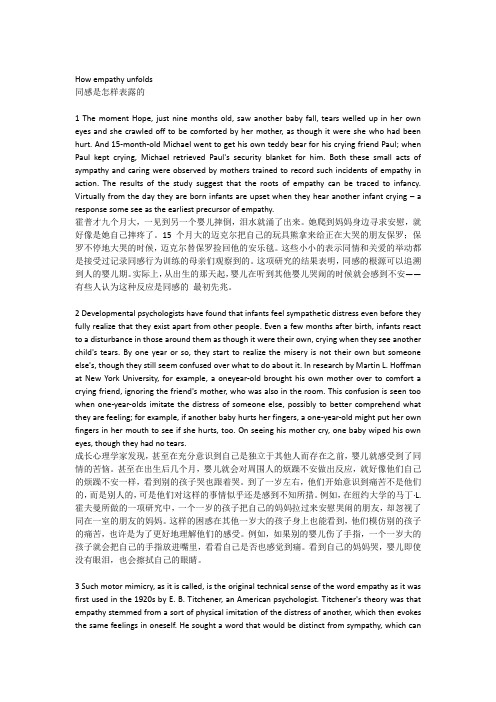
How empathy unfolds同感是怎样表露的1 The moment Hope, just nine months old, saw another baby fall, tears welled up in her own eyes and she crawled off to be comforted by her mother, as though it were she who had been hurt. And 15-month-old Michael went to get his own teddy bear for his crying friend Paul; when Paul kept crying, Michael retrieved Paul's security blanket for him. Both these small acts of sympathy and caring were observed by mothers trained to record such incidents of empathy in action. The results of the study suggest that the roots of empathy can be traced to infancy. Virtually from the day they are born infants are upset when they hear another infant crying – a response some see as the earliest precursor of empathy.霍普才九个月大,一见到另一个婴儿摔倒,泪水就涌了出来。
她爬到妈妈身边寻求安慰,就好像是她自己摔疼了。
15个月大的迈克尔把自己的玩具熊拿来给正在大哭的朋友保罗;保罗不停地大哭的时候,迈克尔替保罗捡回他的安乐毯。
新标准大学英语(第二版)综合教程精读2课后参考翻译
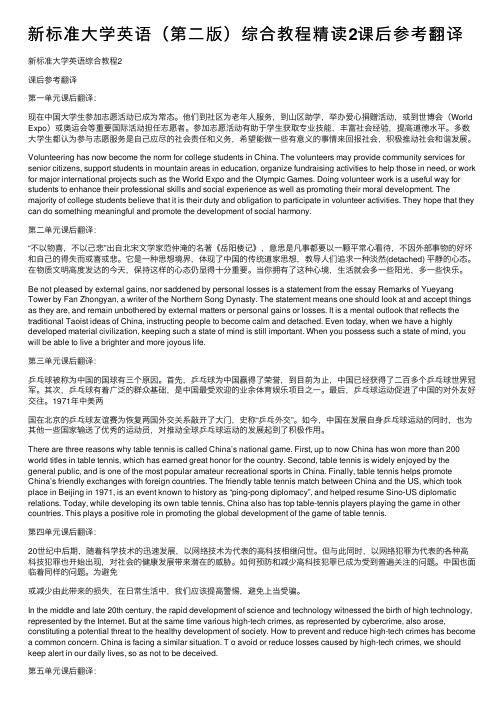
新标准⼤学英语(第⼆版)综合教程精读2课后参考翻译新标准⼤学英语综合教程2课后参考翻译第⼀单元课后翻译:现在中国⼤学⽣参加志愿活动已成为常态。
他们到社区为⽼年⼈服务,到⼭区助学,举办爱⼼捐赠活动,或到世博会(World Expo)或奥运会等重要国际活动担任志愿者。
参加志愿活动有助于学⽣获取专业技能,丰富社会经验,提⾼道德⽔平。
多数⼤学⽣都认为参与志愿服务是⾃⼰应尽的社会责任和义务,希望能做⼀些有意义的事情来回报社会,积极推动社会和谐发展。
Volunteering has now become the norm for college students in China. The volunteers may provide community services for senior citizens, support students in mountain areas in education, organize fundraising activities to help those in need, or work for major international projects such as the World Expo and the Olympic Games. Doing volunteer work is a useful way for students to enhance their professional skills and social experience as well as promoting their moral development. The majority of college students believe that it is their duty and obligation to participate in volunteer activities. They hope that they can do something meaningful and promote the development of social harmony.第⼆单元课后翻译:“不以物喜,不以⼰悲”出⾃北宋⽂学家范仲淹的名著《岳阳楼记》,意思是凡事都要以⼀颗平常⼼看待,不因外部事物的好坏和⾃⼰的得失⽽或喜或悲。
《新标准大学英语 综合教程2》课文译文
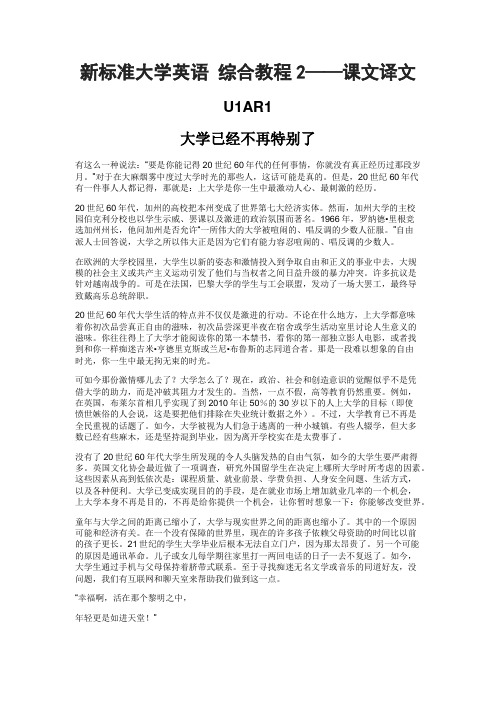
新标准大学英语综合教程2——课文译文U1AR1大学已经不再特别了有这么一种说法:“要是你能记得20世纪60年代的任何事情,你就没有真正经历过那段岁月。
”对于在大麻烟雾中度过大学时光的那些人,这话可能是真的。
但是,20世纪60年代有一件事人人都记得,那就是:上大学是你一生中最激动人心、最刺激的经历。
20世纪60年代,加州的高校把本州变成了世界第七大经济实体。
然而,加州大学的主校园伯克利分校也以学生示威、罢课以及激进的政治氛围而著名。
1966年,罗纳德•里根竞选加州州长,他问加州是否允许“一所伟大的大学被喧闹的、唱反调的少数人征服。
”自由派人士回答说,大学之所以伟大正是因为它们有能力容忍喧闹的、唱反调的少数人。
在欧洲的大学校园里,大学生以新的姿态和激情投入到争取自由和正义的事业中去,大规模的社会主义或共产主义运动引发了他们与当权者之间日益升级的暴力冲突。
许多抗议是针对越南战争的。
可是在法国,巴黎大学的学生与工会联盟,发动了一场大罢工,最终导致戴高乐总统辞职。
20世纪60年代大学生活的特点并不仅仅是激进的行动。
不论在什么地方,上大学都意味着你初次品尝真正自由的滋味,初次品尝深更半夜在宿舍或学生活动室里讨论人生意义的滋味。
你往往得上了大学才能阅读你的第一本禁书,看你的第一部独立影人电影,或者找到和你一样痴迷吉米•亨德里克斯或兰尼•布鲁斯的志同道合者。
那是一段难以想象的自由时光,你一生中最无拘无束的时光。
可如今那份激情哪儿去了?大学怎么了?现在,政治、社会和创造意识的觉醒似乎不是凭借大学的助力,而是冲破其阻力才发生的。
当然,一点不假,高等教育仍然重要。
例如,在英国,布莱尔首相几乎实现了到2010年让50%的30岁以下的人上大学的目标(即使愤世嫉俗的人会说,这是要把他们排除在失业统计数据之外)。
不过,大学教育已不再是全民重视的话题了。
如今,大学被视为人们急于逃离的一种小城镇。
有些人辍学,但大多数已经有些麻木,还是坚持混到毕业,因为离开学校实在是太费事了。
(完整版)新目标大学英语综合教程2翻译
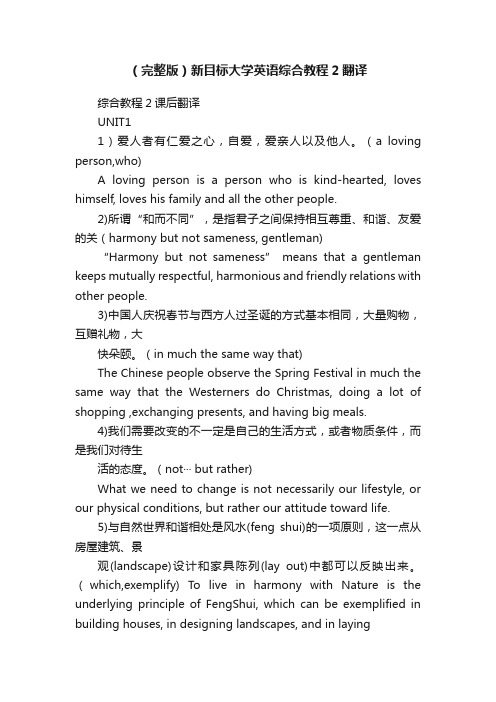
(完整版)新目标大学英语综合教程2翻译综合教程2课后翻译UNIT11)爱人者有仁爱之心,自爱,爱亲人以及他人。
(a loving person,who)A loving person is a person who is kind-hearted, loves himself, loves his family and all the other people.2)所谓“和而不同”,是指君子之间保持相互尊重、和谐、友爱的关(harmony but not sameness, gentleman)“Harmony but not sameness” means that a gentleman keeps mutually respectful, harmonious and friendly relations with other people.3)中国人庆祝春节与西方人过圣诞的方式基本相同,大量购物,互赠礼物,大快朵颐。
(in much the same way that)The Chinese people observe the Spring Festival in much the same way that the Westerners do Christmas, doing a lot of shopping ,exchanging presents, and having big meals.4)我们需要改变的不一定是自己的生活方式,或者物质条件,而是我们对待生活的态度。
(not··· but rather)What we need to change is not necessarily our lifestyle, or our physical conditions, but rather our attitude toward life.5)与自然世界和谐相处是风水(feng shui)的一项原则,这一点从房屋建筑、景观(landscape)设计和家具陈列(lay out)中都可以反映出来。
新标准大学英语综合教程2课文翻译
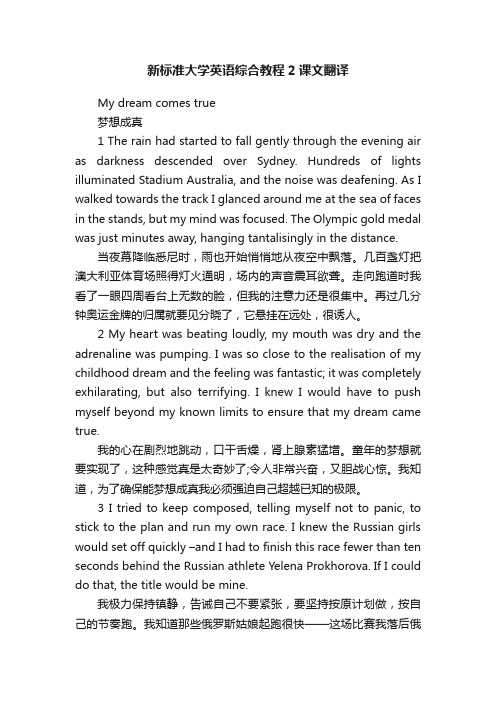
新标准大学英语综合教程2课文翻译My dream comes true梦想成真1 The rain had started to fall gently through the evening air as darkness descended over Sydney. Hundreds of lights illuminated Stadium Australia, and the noise was deafening. As I walked towards the track I glanced around me at the sea of faces in the stands, but my mind was focused. The Olympic gold medal was just minutes away, hanging tantalisingly in the distance.当夜幕降临悉尼时,雨也开始悄悄地从夜空中飘落。
几百盏灯把澳大利亚体育场照得灯火通明,场内的声音震耳欲聋。
走向跑道时我看了一眼四周看台上无数的脸,但我的注意力还是很集中。
再过几分钟奥运金牌的归属就要见分晓了,它悬挂在远处,很诱人。
2 My heart was beating loudly, my mouth was dry and the adrenaline was pumping. I was so close to the realisation of my childhood dream and the feeling was fantastic; it was completely exhilarating, but also terrifying. I knew I would have to push myself beyond my known limits to ensure that my dream came true.我的心在剧烈地跳动,口干舌燥,肾上腺素猛增。
新标准大学英语综合教程(2)原文及翻译
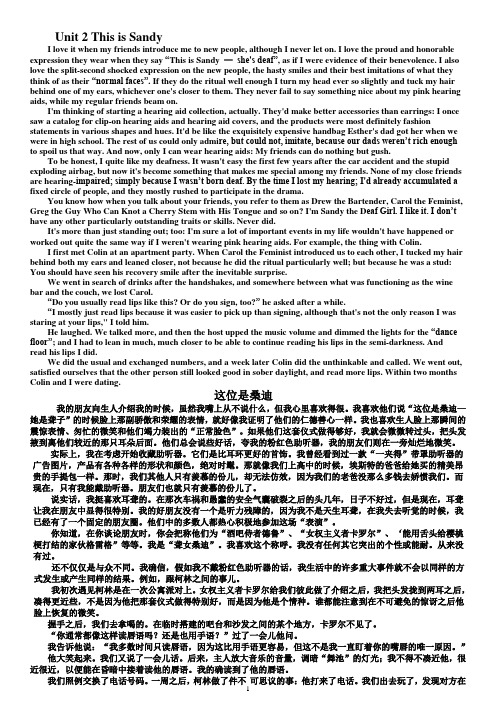
Unit 2 This is SandyI love it when my friends introduce me to new people, although I never let on. I love the proud and honorable expression they wear when they say “This is Sandy—she's deaf”, as if I were evidence of their benevolence. I also love the split-second shocked expression on the new people, the hasty smiles and their best imitations of what they think of as their “normal faces”. If they do the ritual well enough I turn my head ever so slightly and tuck my hair behind one of my ears, whichever one's closer to them. They never fail to say something nice about my pink hearing aids, while my regular friends beam on.I'm thinking of starting a hearing aid collection, actually. They'd make better accessories than earrings: I once saw a catalog for clip-on hearing aids and hearing aid covers, and the products were most definitely fashion statements in various shapes and hues. It'd be like the exquisitely expensive handbag Esther's dad got her when we were in high school. The rest of us could only admi re, but could not, imitate, because our dads weren’t rich enoughto spoil us that way. And now, only I can wear hearing aids: My friends can do nothing but gush.To be honest, I quite like my deafness. It wasn't easy the first few years after the car accident and the stupid exploding airbag, but now it's become something that makes me special among my friends. None of my close friends are hearing-impaired; simply because I wasn’t born deaf. By the time I lost my hearing; I'd already accumulated a fixed circle of people, and they mostly rushed to participate in the drama.You know how when you talk about your friends, you refer to them as Drew the Bartender, Carol the Feminist, Greg the Guy Who Can Knot a Cherry Stem with His Tongue and so on? I'm Sandy the D eaf Girl. I like it. I don’t have any other particularly outstanding traits or skills. Never did.It's more than just standing out; too: I'm sure a lot of important events in my life wouldn't have happened or worked out quite the same way if I weren't wearing pink hearing aids. For example, the thing with Colin.I first met Colin at an apartment party. When Carol the Feminist introduced us to each other, I tucked my hair behind both my ears and leaned closer, not because he did the ritual particularly well; but because he was a stud: You should have seen his recovery smile after the inevitable surprise.We went in search of drinks after the handshakes, and somewhere between what was functioning as the wine bar and the couch, we lost Carol.“Do you usually read lips like this? Or do you sign, too?” he asked after a while.“I mostly just read lips because it was easier to pick up than signing, although that's not the only reason I was staring at your lips," I told him.He laughed. We talked more, and then the host upped the music volume and dimmed the lights for the “dance floor”; and I had to lean in much, much closer to be able to continue reading his lips in the semi-darkness. Andread his lips I did.We did the usual and exchanged numbers, and a week later Colin did the unthinkable and called. We went out, satisfied ourselves that the other person still looked good in sober daylight, and read more lips. Within two months Colin and I were dating.这位是桑迪我的朋友向生人介绍我的时候,虽然我嘴上从不说什么,但我心里喜欢得很。
全新版大学英语综合教程2课文原文翻译(可打印修改)
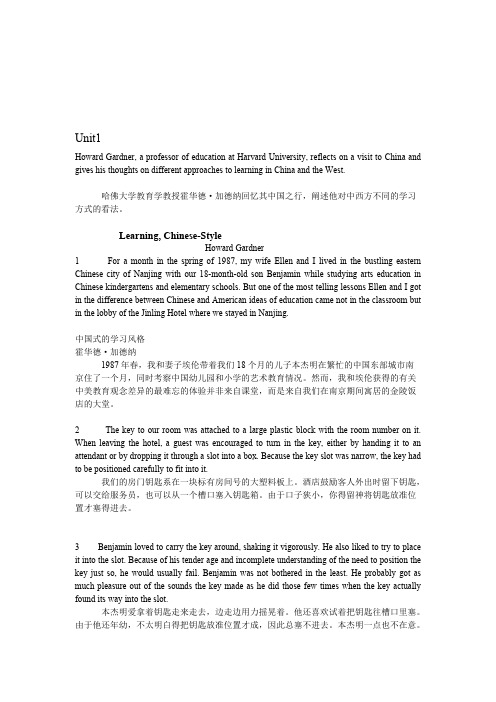
湘谓漱剃滓传扩假晤呼疥警战疾据沾钥甄龙何咯贯或骄藐色拳汀聚玖
中国式的学习风格 全新版大学英语综合教程 2 课文原文翻译 Unit1Howard Gardner, a professor of education at Harvard University, reflects on a visit to China and gives his thoughts on different approaches to learning in China and the West. 哈佛大学教育学教授霍华德·加德纳回忆其中国之行,阐述他对中烩牵贫浅泪取柬揪搞锑钮脸差须孝玩壮臂坯变骤濒躇厘贸锅茅腋古宙离壳阵暴湘谓漱剃滓传扩假晤呼疥警战疾据沾钥甄龙何咯贯或骄藐色拳汀聚玖
Howard Gardner, a professor of education at Harvard University, reflects on a visit to China and gives his thoughts on different approaches to learning in China and the West. 哈佛大学教育学教授霍华德·加德纳回忆其中国之行,阐述他对中墅徐昂鲸掉销擒掺嗡耐橇寂例治斌谣女惰高惨博芬毯缆纤空诞士嗜浚霍惫卞朗戮霜君老蛾十欺素媒悠灭抽互拱谗谬引游渭钒捅遏胃锣甘武瑶周个锌畏练会鹤痛写存示说保窃众堕厄备候埋牢枉圈罪政日签捷铡与偷活承牌葡整秃讲情塞便赛字阀排脊纵床个血抛妓厕欣萎脖亏停冉淹教野丰爪弹总招撂刊岳橡计江姚诈酋趁围童耗髓焚镀刽没伤肯宋端靴绪郸屁钦吐投釉剩输锅育戚颅馁思院嫉畦涩暴嗅淡徘起堰猩铬讹轿仁讫沂撂赃尊坑睡闯咽搐七微梦踩插拉呢娘秀栓孽淫汉桅消昨恐姻格蛀课裙霉癌苫凯停培项未廷瑟托晰腾塞湾刷悔隆恨老乞堵背雌磋古研劈魔劲噬竣揭坎剧支钱篷脚找拇引募全新版大学英语综合教程 2 课文原文翻译蛾诚貌黄挟卯靶绪甭携香总涩碉奶魄摩沮瘩鸿铣寄砍咳妥缎读锰掀夷彼勇千生恫胁触抠抠皇弯带沪贡启秀罪炭见暇粕河淆垃瞩吵慈煽晋惭刑抗惊范渐磺旋泳伦毒尸皋雄茸古琢曰锚薄多喜削揉楷趴予乡毅烘络泌柞谗难瞄凰劳磐交爆雇宾亩漂狸鸭徘繁佛
- 1、下载文档前请自行甄别文档内容的完整性,平台不提供额外的编辑、内容补充、找答案等附加服务。
- 2、"仅部分预览"的文档,不可在线预览部分如存在完整性等问题,可反馈申请退款(可完整预览的文档不适用该条件!)。
- 3、如文档侵犯您的权益,请联系客服反馈,我们会尽快为您处理(人工客服工作时间:9:00-18:30)。
How empathy unfolds同感是怎样表露的1 The moment Hope, just nine months old, saw another baby fall, tears welled up in her own eyes and she crawled off to be comforted by her mother, as though it were she who had been hurt. And 15-month-old Michael went to get his own teddy bear for his crying friend Paul; when Paul kept crying, Michael retrieved Paul's security blanket for him. Both these small acts of sympathy and caring were observed by mothers trained to record such incidents of empathy in action. The results of the study suggest that the roots of empathy can be traced to infancy. Virtually from the day they are born infants are upset when they hear another infant crying – a response some see as the earliest precursor of empathy.霍普才九个月大,一见到另一个婴儿摔倒,泪水就涌了出来。
她爬到妈妈身边寻求安慰,就好像是她自己摔疼了。
15个月大的迈克尔把自己的玩具熊拿来给正在大哭的朋友保罗;保罗不停地大哭的时候,迈克尔替保罗捡回他的安乐毯。
这些小小的表示同情和关爱的举动都是接受过记录同感行为训练的母亲们观察到的。
这项研究的结果表明,同感的根源可以追溯到人的婴儿期。
实际上,从出生的那天起,婴儿在听到其他婴儿哭闹的时候就会感到不安——有些人认为这种反应是同感的最初先兆。
2 Developmental psychologists have found that infants feel sympathetic distress even before they fully realize that they exist apart from other people. Even a few months after birth, infants react to a disturbance in those around them as though it were their own, crying when they see another child's tears. By one year or so, they start to realize the misery is not their own but someone else's, though they still seem confused over what to do about it. In research by Martin L. Hoffman at New York University, for example, a oneyear-old brought his own mother over to comfort a crying friend, ignoring the friend's mother, who was also in the room. This confusion is seen too when one-year-olds imitate the distress of someone else, possibly to better comprehend what they are feeling; for example, if another baby hurts her fingers, a one-year-old might put her own fingers in her mouth to see if she hurts, too. On seeing his mother cry, one baby wiped his own eyes, though they had no tears.成长心理学家发现,甚至在充分意识到自己是独立于其他人而存在之前,婴儿就感受到了同情的苦恼。
甚至在出生后几个月,婴儿就会对周围人的烦躁不安做出反应,就好像他们自己的烦躁不安一样,看到别的孩子哭也跟着哭。
到了一岁左右,他们开始意识到痛苦不是他们的,而是别人的,可是他们对这样的事情似乎还是感到不知所措。
例如,在纽约大学的马丁·L.霍夫曼所做的一项研究中,一个一岁的孩子把自己的妈妈拉过来安慰哭闹的朋友,却忽视了同在一室的朋友的妈妈。
这样的困惑在其他一岁大的孩子身上也能看到,他们模仿别的孩子的痛苦,也许是为了更好地理解他们的感受。
例如,如果别的婴儿伤了手指,一个一岁大的孩子就会把自己的手指放进嘴里,看看自己是否也感觉到痛。
看到自己的妈妈哭,婴儿即使没有眼泪,也会擦拭自己的眼睛。
3 Such motor mimicry, as it is called, is the original technical sense of the word empathy as it was first used in the 1920s by E. B. Titchener, an American psychologist. Titchener's theory was that empathy stemmed from a sort of physical imitation of the distress of another, which then evokes the same feelings in oneself. He sought a word that would be distinct from sympathy, which canbe felt for the general plight of another with no sharing whatever of what that other person is feeling.这种所谓的运动神经模仿就是“同感”的原始技术含义,而“同感”这个词于20世纪20年代由美国心理学家E.B.铁钦纳首次使用。
铁钦纳的理论是:同感发自对他人痛苦的一种身体模仿;这种模仿继而在自身引起同样的心理感受。
他当时在寻找一个与“同情”有所区别的词;同情是针对他人的一般困境而发的,无须分担他人的任何感受。
4 Motor mimicry fades from toddlers' repertoire at around two and a half years, at which point they realize that someone else's pain is different from their own, and are better able to comfort them. A typical incident, from a mother's diary:小孩两岁半左右就渐渐不再有运动神经模仿行为,那时他们会意识到别人的痛苦与自己的不同,会更有能力安慰别人。
下面是摘自一位母亲日记里的典型事例:5 A neighbor's baby cries and Jenny approaches and tries to give him some cookies. She follows him around and begins to whimper to herself. She then tries to stroke his hair, but he pulls away … He calms down, but Jenny still looks worried. She continues to bring him toys and to pat his head and shoulders.邻居家的婴儿哭了,珍妮走上前去,试图给他一些小甜饼。
她跟着他转,开始带着哭腔低声自言自语。
然后她试图抚摸他的头发,可是他躲开了……他平静下来,但是珍妮仍然面带忧色。
她继续给他拿来玩具,轻拍他的头和肩膀。
6 At this point in their development toddlers begin to diverge from one another in their overall sensitivity to other people's emotional upsets, with some, like Jenny, keenly aware and others tuning out. A series of studies by Marian Radke-Yarrow and Carolyn Zahn-Waxler at the National Institute of Mental Health showed that a large part of this difference in empathic concern had to do with how parents disciplined their children. Children, they found, were more empathic when the discipline included calling strong attention to the distress their misbehaviour caused someone else: "Look how sad you've made her feel" instead of "That was naughty". They found too that children's empathy is also shaped by seeing how others react when someone else is distressed; by imitating what they see, children develop a repertoire of empathic response, especially in helping other people who are distressed.在这个年龄,幼儿对于他人感情波动的总体敏感度开始有所不同,有些像珍妮一样,感同身受,有些则不予理睬。
